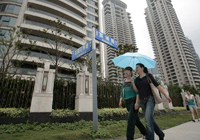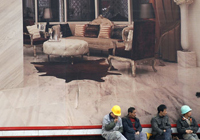Bizchina
Property policy watch
(chinadaily.com.cn)
Updated: 2010-05-05 17:17
 |
Large Medium Small |
|
Policies |
April 30: Beijing unveils tough measures to curb housing price rises
Beijing banned all families from buying more than one home Friday, in a tough set of restrictions designed to curb speculation and soaring home prices.
The government also ordered the implementation of central government policies that ban mortgages for purchases of a third or third-plus home.
It also instigated a central government ban on mortgages to non-local residents who cannot provide more than one year of tax returns or proof of social security payments in Beijing. [Full Story]
April 19: Government to punish property price manipulation
 |
In the regulation, the ministry also ordered developers not to take deposits for sales of uncompleted apartments without proper approval and barred them from charging "abnormally high" prices. [Full Story]
April 17: Banks can refuse third-home loans
|
 |
The State Council asked related departments and local governments to take strict measures to curb speculative property purchases and to increase residential housing supplies. It also said banks can refuse loans to people buying their third houses in areas suffering from soaring property prices.
Provincial and municipal governments in areas with soaring prices can also temporarily restrict the number of properties people can buy, in accordance with the situation in their jurisdictions. [Full Story]
April 14: Second home payment raised to curb soaring prices
The Chinese government raised down payment for people buying their second homes to a minimum of 50 percent of the property value from 40 percent, in a bid to curb speculation in the country's property market.
First-home buyers have to pay more than 30 percent of property prices if the property area is above 90 square meters, the statement said. [Full Story]
|
Experts' Views |
Learn German lessons
|
 |
|
Fang Quan, chief editor of Capital Week magazine |
The policies that China has used to control real estate market will not have a major impact on real estate speculators, and many famous scholars and economists are actually real estate investors and use their intellectual and commercial power to influence policymaking. The continual rise of China's real estate prices has a negative influence on China's overall economy and the people's livelihood.
We should draw lessons from Germany, which has had quite stable home price growth through imposing heavy taxes on house speculation. If the Chinese government imposes a heavy tax upon real estate speculation, and ensure speculators cannot profit from the real estate market, then China can solve the problem of uncontrollable home prices.
Tackle social issues
 |
|
Pan Shiyi, president of SOHO China |
Management problems
 |
|
Feng Lun, board chairman of Beijing Vantone Real Estate Co Ltd |
Legislators had found, for example, that local governments had only delivered 26 percent of their promised supply of low-priced affordable housing. The government, therefore, should bear most of the responsibility for the current real estate troubles. Home prices this year won't rise sharply like they did in 2009, they will be quite stable.
Look beyond big cities
 |
|
Yi Xiaodi, board chairman of Sunshine100 Co Ltd |
Target speculators
 |
|
Yi Xianrong, economist, Chinese Academy of Social Sciences |
We should not underestimate the effect of the new policies targeted at controlling surging home prices. The intention of the policies this time is very clear, gradually adjusting the preferential policies the government previously implemented to support home sales. Last year, due to the fallout from the global financial crisis, the government released a series of preferential policies to stimulate house purchases. This continued in the first quarter of this year. The new moves, however, are targeted at those preferential policies that raise the cost of speculative housing deals.
China's real estate time bomb ticking
PBOC adviser says property controls to avert crash
|
Market |
May Day chill grips housing industry
|
 |
Average daily transactions of completed apartments in Beijing dropped to two units during the three-day holiday, down 96 percent year-on-year, and that of homes yet to be constructed fell 35 percent to 205 units, according to Beijing Real Estate Transaction website. Compared with April, the transaction volume decreased more than 80 percent. [Full Story]
Property speculators yet to feel the heat
It looks it will take a while before government policies to cool down the real estate market have their desired effect on property speculators.
According to the Chinese newspaper Economic Observer, the high-end property market in Beijing, which has some of the priciest real estate in China, still performed strongly despite the strong government intervention in the sector since mid-April.
The newspaper reported that buyers of expensive properties consist mainly of proprietors of private energy companies, as well as senior executives of financial services and real estate companies. [Full Story]
Tough rules set to drop home prices 30%
|
 |
In addition, non-locals are not allowed to buy an additional home unless they have worked in Beijing for a year, the government says. [Full Story]
Real estate sales witness big fall
The booming property market suddenly cooled down in April - in home sales, at least - after a range of government measures aimed at curbing runaway prices.
However, the measures are also fueling concerns that growth could slow in the world's third largest economy, already beset by export uncertainties. [Full Story]
Realty sector cooling off
?
The government's intensive launch of tightening property policies in mid-April has led millions of potential home buyers to adopt a wait-and-see attitude, leading to a plummet in property sales and a slight drop in the prices of some suburban projects. But a large-scale price drop in the country's key cities is unlikely to happen until the second half of this year, industry experts say.
Realty curbs will not pinch growth
|
 |
Li Daokui, a member of the central bank's monetary policy committee, said the tightening measures would in no way dampen real estate investment, a key component of China's economic growth. [Full Story]
More stories
Working out the property puzzle
Luxury home prices down, thanks to new regulations
Realtors lower price as demand for homes slows









